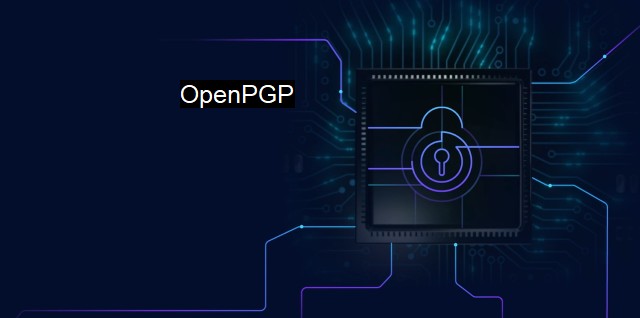What is OpenPGP?
The Vital Role of OpenPGP in Ensuring Digital Privacy and Security in Today's Cyber World
OpenPGP, short for Open Pretty Good Privacy, signifies an encryption scheme virtually unbreakable, developed from an open source software framework. Endorsed by security professionals worldwide and routinely used to protect sensitive information, OpenPGP denotes a public-key cryptography structure that makes documents, emails, files, and even entire disk partitions confidential, shielding them from unpermitted eyes.OpenPGP, in the cybersecurity arena, is chiefly known for guaranteeing the confidentiality and accuracy of digital data through encryption, authenticity verification, non-repudiation, and digital signatures. By allowing only assigned users to view, modify or distribute data, OpenPGP supplies both individual consumers and businesses with a high level of information security and peace of mind. The framework is designed to work efficiently and does not make computer systems sluggish.
OpenPGP's worldwide success in cybersecurity is due to its foundation on the public key cryptography principle. Users have two unique but mathematically connected keys, one public and the other private. The public key, as the term suggests, can be distributed freely and allows anyone to encrypt messages targeted for the key owner. On the other hand, the private key, kept secret by its owner, decrypts these messages. As long as the private key remains secure, no one can decipher messages encrypted with its corresponding public key. This principle guarantees confidentiality in a communication.
This dual-key system is also vital for authenticating a message sender's identity and maintaining message integrity. The sender encrypts the message using their private key, the process known as 'signing.' When the recipient receives the ‘signed’ message, they use the sender’s public key to decrypt the specific portion, verifying both the sender's authenticity and the message's integrity since any alteration to the original message will render it undecipherable. As a result, falsification of the sender's identity and unauthorized alteration of the message become virtually impossible, preserving users’ trust in data authenticity. This implementation widely supports non-repudiation efforts.
In the antivirus landscape, OpenPGP integrates well. Antivirus software fundamentally seeks out malicious code that can compromise a system's security. OpenPGP complements this by ensuring encrypted malware, which is often unidentifiable to antivirus software, cannot infiltrate a system and cause damage. For instance, if an encrypted virus arrives in an email, it remains encrypted and harmless until decrypted with a private key. Even if a malicious third party gets access, they cannot utilize the information or execute any malicious codes without decryption. Consequently, PGP encryption forms an additional layer of antivirus defense by stopping threats before they are detected as harmful by antivirus software.
Despite the widespread adoption and robustness of OpenPGP, one cannot downplay the significance of user behavior in its effectiveness. OpenPGP functions most effectively when users understand the essentiality of guarding their private keys and follow best practice procedures accurately and consistently. Such behaviors include not sharing private keys, using reliable key servers, verifying public keys before use, and keeping software up-to-date to protect against the latest threats.
OpenPGP offers a sophisticated instrument for individuals, businesses, and organizations to realize robust confidentiality, authenticity, and integrity in data transmissions. This tool's success talks volumes about OpenPGP's apt potential, especially wherein data sensitivity and private communication are at the forefront of consideration. Its intersection with antivirus measures showcases the comprehensive approach to security that is a crucial need given the complexity of threats in digital spaces today. And while it isn't an all-in-one solution to cybersecurity, it certainly constitutes a substantial layer within a comprehensive information security arsenal.

OpenPGP FAQs
What is OpenPGP?
OpenPGP is a standard that defines encryption protocols used for securing emails, files, and messages. It uses asymmetric encryption algorithms to facilitate secure communication between parties.How does OpenPGP enhance cybersecurity?
OpenPGP encryption ensures that only the intended recipient can read the message or file. This makes it hard for attackers to intercept and read sensitive information. By using OpenPGP, users can ensure the privacy and confidentiality of their communications.Can OpenPGP be used for antivirus?
OpenPGP is primarily a tool for secure communication and does not have antivirus capabilities. However, OpenPGP encryption can help protect against malware by preventing hackers from reading or tampering with sensitive data.How can I get started with OpenPGP?
To get started with OpenPGP, you can use one of the many free OpenPGP-compatible applications available online. These applications will allow you to generate your own keys for secure communication. You will then need to share your public key with others for them to securely communicate with you.Related Topics
PGP encryption Email encryption File encryption Web of trust Public key infrastructure
| | A | | | B | | | C | | | D | | | E | | | F | | | G | | | H | | | I | | | J | | | K | | | L | | | M | |
| | N | | | O | | | P | | | Q | | | R | | | S | | | T | | | U | | | V | | | W | | | X | | | Y | | | Z | |
| | 1 | | | 2 | | | 3 | | | 4 | | | 7 | | | 8 | | |||||||